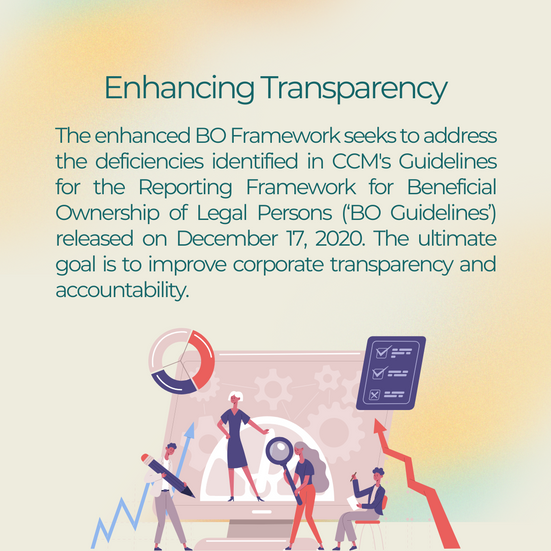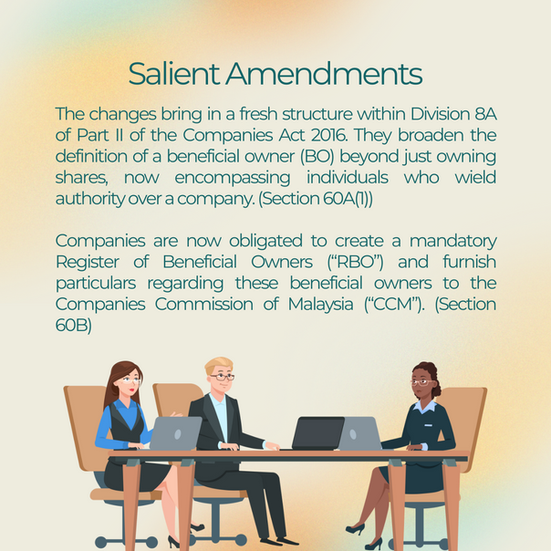Companies (Amendment) Bill 2023: Beneficial Ownership Reporting Requirements
- brandonwong528
- Jan 18, 2024
- 3 min read
by MH Law | January 18, 2024 | Legal Alerts
The Malaysian Parliament approved the Companies (Amendment) Bill 2023 on November 28, 2023, in the Dewan Rakyat. The bill will now move to the Dewan Negara and, if approved, will proceed for royal assent before being officially gazetted into law. The effective date will be determined by the Minister of Domestic Trade and Cost of Living through notification in the Gazette.
One of the key objectives of the bill is to establish a framework for reporting the beneficial ownership of companies and to enhance existing provisions on schemes of arrangement, reconstruction, and corporate rescue mechanisms within the Companies Act 2016.
This article will examine the proposed framework for reporting beneficial ownership of companies.
Definition of "beneficial owner"
The proposed amendment to Section 2 of the Act introduces a sub-paragraph (b) under the definition of "beneficial owner," stating that, in the context of a company, it refers to a person as outlined in Section 60A of the Act. The existing definition concerning beneficial ownership of shares is retained as sub-paragraph (a).
Reporting of Beneficial Ownership Framework
The bill introduces a new Division 8A (sections 60A to 60E) to Part II of the Act.
Beneficial Owner of the Company
Section 60A(1) elaborates on the expanded definition, stating that a person is a beneficial owner of a company if they are a natural person who ultimately owns or controls the company, including those who exercise ultimate effective control. Section 60A(2) empowers the Registrar of the Companies Commission of Malaysia to issue guidelines for identifying a beneficial owner.
Register of Beneficial Owners of a Company
Section 60B outlines requirements for companies to maintain a Register of Beneficial Owners, including information such as full name, addresses, nationality, identification, and residence details. The company must notify the registrar of any changes within 14 days. The information of former beneficial owners should be retained for seven years.
Duties and Confirmations
Section 60C imposes duties on companies to require members to disclose beneficial ownership, seek confirmation of changes, and confirm the correctness of information in the Register. Non-compliance with these duties is considered an offence.
Offences
Failure to comply with the specified duties outlined in Section 60C, as well as any contravention of notices issued, is considered an offense. False statements made in purported compliance with notices are also offences.
Duty of the Beneficial Owner to Provide Information
Section 60D places a duty on individuals who believe they are beneficial owners to notify the company promptly, provide necessary information, and notify the company of any changes. Non-compliance is considered an offence.
Exemption from Division 8A
The Minister has the authority, through Gazette publication, to exempt certain classes of companies from the provisions of Division 8A if they are subject to similar requirements under other written laws.
Information in the Annual Return
Amendments to Section 68(3) will include the requirement to include beneficial ownership information in the annual return.
Foreign Companies
For foreign companies, additional information, including beneficial ownership details, will be required for registration and inclusion in annual returns.
Penalties for Non-Compliance
Non-compliance with these requirements constitutes an offence, attracting penalties under Section 588, including fines up to RM50,000, a maximum 3-year jail term, or both.
Aside from existing penalties, non-compliance with Section 60B regarding RBO maintenance and CCM notification incurs separate penalties. Upon conviction, both the company and implicated officers could face fines not exceeding RM20,000, with an additional daily fine of up to RM500 for persistent violations post-conviction.
Implications
The proposed revisions, aimed at aligning businesses with global reporting norms, usher in a transparency drive laden with profound implications:
1. Escalation in Administrative Complexities:
Entities grappling with intricate ownership structures and nominee arrangements, whether for meeting resident director prerequisites or securing preferential tax treatment for locally-owned ventures, now find themselves navigating a heightened administrative maze. The envisaged modifications call for proactive engagement in fulfilling obligations linked to the disclosure of beneficial ownership (BO). Individuals recognising themselves as beneficial owners or reasonably suspecting others to hold such status are duty-bound to apprise the company of their beneficial ownership. This broadens the spectrum of compliance for companies navigating the intricacies of ownership configurations.
2. Dilution of Disclosure Responsibilities:
The heightened requisites for unravelling beneficial ownership intricacies foist an expanding onus not merely on the company and its executives but also on shareholders and authentic beneficial owners. The augmented disclosure obligations shift the mantle of responsibility across a diverse array of stakeholders, reshaping compliance into a collective venture. This marks a significant departure, extending the ambit of disclosure responsibilities beyond the corporate entity and its immediate leadership, enveloping a broader spectrum of stakeholders.
In conclusion, while the bill aims to bolster corporate governance in Malaysia, the adaptation of businesses to these transparency measures and the equilibrium between transparency and investor confidence remain to be observed.
Have a question? Please contact us at info@munhoelaw.com





















